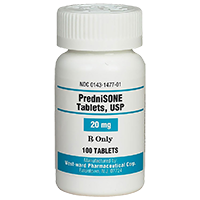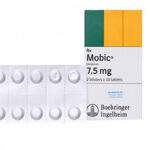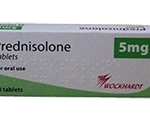
Prednisone

What is Prednisone?
Prednisone is a generic tablet medicine which contains the active substance prednisone, a synthetic hormone that belongs to the group of corticosteroids. Corticosteroids are hormones produced by the adrenal glands that possess anti-inflammatory activity. Anti-inflammatory drugs reduce pain, swelling, stiffness, redness and heat in the affected tissues.
Prednisone is used in the following conditions:
- in addition to other medicines, in the treatment of rheumatic diseases (eg rheumatoid arthritis, Still’s disease, ankylosing spondylitis, acute gouty arthritis)
- as therapy for severe and / or diffuse inflammations, for example in particular cases of systemic lupus erythematosus (chronic disease due to an alteration of the immune system that causes inflammation and tissue damage), dermatomyositis (chronic inflammatory disease of the muscles), inflammations that affect the structures adjacent to the joints (for example, bags, tendons, connective tissue), cardiac inflammation of rheumatic origin
- in case of severe or debilitating allergies, such as bronchial asthma, contact dermatitis, atopic dermatitis, which do not respond or respond inadequately to other therapies,
- in the treatment of sarcoidosis (inflammatory disease that can affect several organs, but mainly lungs and lymph nodes)
- to treat certain blood diseases (eg some forms of anemia)
- as palliative therapy of some malignant proliferations (tumors) of white blood cells (leukemias) or of some organs (eg lymph node tumors)
- in addition to other medicines, for the treatment of certain diseases of the gastrointestinal tract (eg ulcerative colitis).
Pharmacodynamics

Prednisone is a synthetic glucocorticoid with anti-inflammatory, immunosuppressive and antiallergic action. Prednisone has, by weight, 4-5 times higher anti-inflammatory effect than cortisone, but affects electrolyte turnover to a lesser extent. The mechanism of action is not yet fully understood.
In the adrenal glands the hormone cortisol is produced. Cortisol has many functions in the body and is vital. When the body becomes stressed, eg. in case of infection or if we encounter an accident or participate in a contest higher levels of cortisol are needed.
The adrenal glands just excrete the amount we need to tolerate different stresses. Prednisone contains cortisone similar to cortisol. At treatment with higher doses of prednisolone (> 5-7 mg) adrenal glands reduce cortisol production, since there is so much Prednisone (cortisone) in the blood. When the dose of Prednisone is reduced, the adrenal glands recommence production of cortisol, but they can be sluggish. For that reason, the dose of prednisolone should be reduced gradually. Prednisone treatment should never be stopped suddenly since the adrenal glands do not have time to produce enough cortisol.
Posology

The dose of Prednisone may need to be adjusted for stressful events, such as surgery or an ongoing infection.
In early childhood, the medicine is administered in cases of actual need, under the direct supervision of the doctor. Children undergoing prolonged therapy should be closely monitored for growth and development. The use of the drug without therapeutic necessity constitutes doping and can in any case lead to positive doping tests.
Always take this medicine exactly as your doctor or pharmacist has told you. If you are not sure, consult your doctor or pharmacist.
The dose of Prednisone prescribed by your doctor depends on the severity of the disease. Usually the maintenance dose should not exceed 10-15 mg of prednisone per day.
The initial dose may be higher and, on the advice of the doctor, then gradually reduced to the maintenance dose based on:
- the symptoms of the disease;
- the response to Prednisone
If you take more than 1 recommended dose of Prednisone, an increase in the undesirable effects on electrolyte balance (salts) is likely, which can lead to an increased risk of heartbeat abnormalities, and on the metabolism of some minerals such as calcium, which can lead to an increased risk of fractures.
Patient instructions
Prednisone is taken orally. Take the number of tablets prescribed by your doctor. The doctor will discuss with you the duration necessary for the treatment.
Contact your doctor if you are worried or if you observe an increase in side effects. Contact the doctor for immediate instructions.
Do not abruptly discontinue taking Prednisone. If you stop taking Prednisone:
- the symptoms of the illness from which he suffers may reappear
- cortisone withdrawal syndrome (a serious disease) may occur
- caused by lack of cortisol production by the body).
If you have any doubts about the use of this medicinal product, refer to the doctor or pharmacist.
In the body, cortisol is secreted in the morning, which helps to wake us up. Therefore, it is important that you take your Prednisone tablets in the morning. A late intake of cortisone increases the risk of sleep problems.
Prednisone efficiency
Prednisone increases the risk of gastrointestinal bleeding associated with the use of non-steroidal anti-inflammatory drugs (NSAIDs), such as acetylsalicylic acid, diclofenac and ibuprofen, the effects of blood thinning of anticoagulant drugs increase or decrease, depending on the subject; in particular, Prednisone increases the anticoagulant effect of warfarin.
If you are taking any of the medicines listed above, your doctor may prescribe you another medicine or adjust the dose of Prednisone or another medicine.
Since the body often needs higher levels of cortisol during ex fever or other stress, the dose of Prednisone may need to be increased in such situations. Therefore, in such cases, medical contact is important.
Prednisone, especially at high dose, may contribute to increased blood sugar (glucose) and diabetes, especially in people who have other risk conditions for diabetes, such as overweight or heredity for diabetes. Signs of high blood sugar can be fatigue, increased thirst and large amounts of urine. cortisone-induced blood sugar increase is most pronounced in the afternoon and evening and the patient may need to measure blood sugar in cortisone treatment.
Cortisol and also Prednisone (cortisone) also make us feel stronger, fitter and better than we really are. Therefore, make no important decisions when treating with higher doses of Prednisone.
Benefits in Hashimoto’s Thyroiditis
The treatment of Hashimoto’s thyroiditis can be based on simple observation (in the presence of euthyroidism), or on hormone replacement therapy (in the presence of hypothyroidism). This is based on the use of levothyroxine (eutirox), a synthetic analogue of the hormone thyroxine (T4) produced by the thyroid. Daily oral administration restores the normal plasma level of thyroid hormones, positively resolves any symptoms of hypothyroidism and prevents complications. The dosage used is relative to the hormonal deficit, requires time to be optimized and may vary based on periodic blood tests.
The therapy aimed at resolving the autoimmune disorder through the use of Prednisone helps to reduce autoimmune symptoms. Hashimto’s thyroiditis is an acute or subacute inflammation whose unique therapy is precisely Prednisone. Other therapies or underestimating the use of Prednisone would interfere with resolving the inflammation and allowing the production of autoantibodies (turned towards one’s own thyroid) that would alter the thyroid tissue, up to the atrophy of the gland itself, with consequent loss of the thyroid function. Therefore the obvious benefit of immunosuppression with Prednisone, in this case, is that the drug helps to avoid these complications.
Use in Hashimoto’s Thyroiditis

For general effects or SR> 50 mm, Prednisone is given in the amount of 30mg x 1, in other cases – 20mg x 1. The dose is increased by 5 mg / week for 4–6 weeks. The effect is often dramatic with measurable results after 1-2 days. Keep regular appointments with your general practitioners, in exceptional cases with endocrinologist while taking the drug for Hashimoto’s thyroiditis.
Contraindications
Prednisone should not be used
- if you are allergic to prednisone or any of the other ingredients of this medicine
- if you suffer from:
- tuberculosis (TB), a bacterial infection that usually affects the lungs;
- ulcers of the stomach or intestine;
- mental disorders;
- viral infections (eg herpes simplex eye disease);
- generalized fungal infections;
- severe weakening of the bones (severe grade osteoporosis);
- if his immune system is altered;
- if you have a high level of sugar (glucose) in your blood and cannot keep it under control (unstable diabetes)
You must tell your doctor if you have (at the time) or had (in the past) any of the following disorders, or if you have been subjected to any of the following treatments:
- intestinal diseases such as colitis and diverticula;
- bowel surgery;
- wounds in the stomach wall (active peptic ulcer);
- kidney disease;
- high blood pressure;
- severe muscle weakness;
- weakening of the bones (mild or moderate osteoporosis);
- tooth infections or abscesses;
- psychological or emotional disorders;
- too high level of sugar (glucose) in the blood (diabetes). Your doctor could
- increase the dose of diabetes drugs and monitor blood glucose levels closely
Prednisone can have an effect on the immune system. This compromises its ability to fight infections. If your immune system is altered:
- vaccinations may not be effective during treatment with Prednisone;
- there may be a greater risk of serious infections. Treatment with Prednisone may increase the likelihood of developing an infection. If you are developing an infection, it may be more difficult to detect it during treatment with Prednisone.
Treatment with Prednisone can have a negative effect on the way calcium is metabolized in your bones. For this reason he should clarify with his doctor the risk of osteoporosis (loss of bone mass and fractures) especially if there are members of his family with a history of bone fractures, if he does not exercise regularly, if he is a woman in or post-menopause or if you are elderly.
It may be necessary to reduce the dose of Prednisone in case of:
- hypothyroidism (thyroid gland not sufficiently active)
- liver cirrhosis (liver disease caused by alcoholism or hepatitis)
- adrenal insufficiency. This occurs when the adrenal gland does not produce a sufficient amount of cortisol (a hormone) which is particularly likely in stressful situations, for example with infections in progress, after an accident or if you are subjected to greater physical fatigue.
If you take Prednisone for several months or more, your doctor will perform periodic checks, such as: eye exam, blood test, blood pressure check.
Side effects

Like all medicines, Prednisone can cause side effects, although not everybody gets them. The frequency and severity of the side effects listed below depends on the dosage and duration of treatment.
Very common side effects of Prednisone:
- Ulcers of the oral cavity
- Burning sensation and stomach pain.
- Nausea, vomiting, diarrhea
- Abdominal swelling with cramps and pain.
- General malaise, weakness, fever
- Urticaria, Pruritus, Ponfi
- Skin redness, acne, skin striae
- Headache, dizziness
- Irritation of the throat, cough
- Infections of different causes, reduction of the ability to fight them. Infections may be more severe or symptoms may be masked.
Very rare side effects of Prednisone:
- Overactive thyroid (hyperthyroidism) which can cause periodic episodes of paralysis.
Posted in Anti-Inflammatory
(4 voices, average: 5 of 5) 28241 views






















